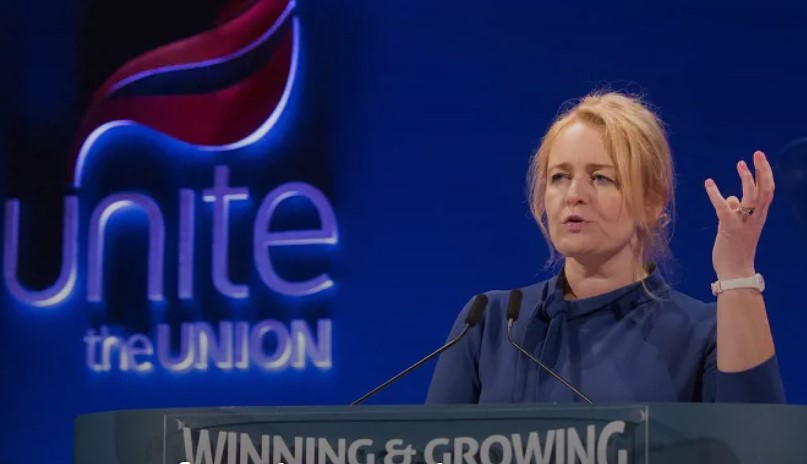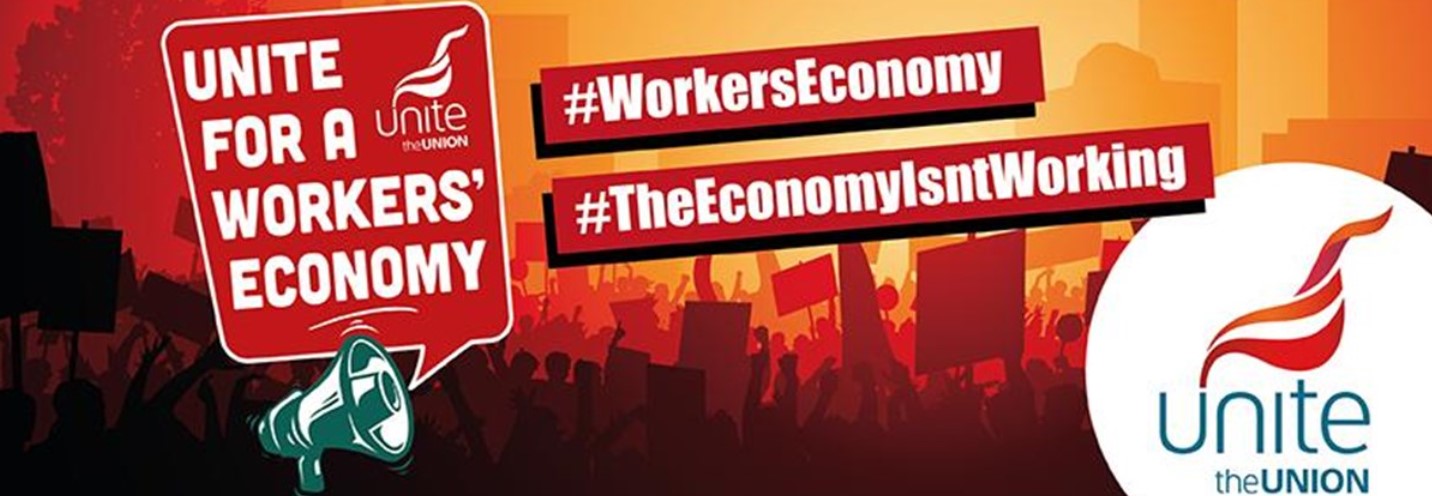It is a very positive step for Sharon Graham, the General Secretary of Unite, to announce that her union is going to use its political fund to campaign for more radical policies. She has come as a breath of fresh air to the union membership in terms of her willingness to use the industrial power of the union to defend the workplace interests and livelihoods of members, but up to now, she has appeared to show an ambivalence towards the Labour Party.
Through its affiliation, Unite is one of the biggest contributors to Labour Party funds. Although the Tories abhor the whole idea of the trade unions paying money to the Labour Party, it has historically been the unions who have been its bedrock and in terms of its transparency and accountability, compared to other sizeable donations to parties, it is actually the cleanest money in politics.
With the drift of the Labour leadership away from any firm commitments and policies in the interests of working people and Unite members in particular, the union took the decision some time ago to only pay the minimum affiliation fee and to maintain the extra in its funds. In the run-up to the 2019 election, the union gave £3.5m, the biggest of any of its donations. Yet even paying the minimum, Unite has already given the Labour Party more than a million pounds so far this year, still clocking up, in other words, over £100,000 a month.
Unite launching a ‘grassroots’ campaign
It has appeared in the past as if the leadership of Unite were adopting a ‘hands-off’ attitude to the Labour Party, unhappy with the leadership of Keir Starmer, but unwilling to do anything about it. As we have argued on many occasions, that is a wrong policy but it seems to be changing.
According to reports last week, the union is launching “a grassroots campaigns in scores of industrial constituencies across the UK demanding more radical policies on energy, steel and green jobs” (Guardian, September 17). “We are diverting some of the money that we would probably have given to Labour,” Sharon Graham told the Guardian, “to have three major campaigns that we are starting, in the ‘red wall’ seats where these are the issues for those constituents”.
The union is in agreement with public opinion, being in favour of the re-nationalisation of the energy sector that was largely sold off by Margaret Thatcher. The union is also against the issuing of new government licences for North Sea oil and gas exploration. Unfortunately, these are not policies supported by the Rachel Reeves/Keir Starmer Labour leadership.
Steelmaking is seen by Unite as a key industry, as indeed it is. Tory Chancellor Jeremy Hunt has recently accounced a half a billion hand-out to Tata Steel to ‘modernise’ its steel plants, although even that huge sum will not stop the loss of some jobs. Unite is calling for government ‘green funds’ to be used in the ‘greening’ of the steel industry.
Nationalisation with compensation only on proven need
Considering that the remnants of British Steel, after massive closures, were sold off by the Tories because of the need for public subsidies, it is a bit of a sick joke to see the privatised industry only surviving today through public largesse, except in a framework that is much less accountable to the government.

Referring to government investment, Unite’s policy statement on steel says, “No more money for nothing. Public investment for steel must come with solid job guarantees”. That is correct, but it would have been better, in our opinion, if the union had called for the renationalisation of the steel industry.
As for nationalising energy, we would dispute the £90bn cost suggested by Sharon Graham at the TUC conference. In our opinion, compensation to private owners should only be based on proven need and those who have fleeced the industry for years – just like those who own the water companies – should not be given a windfall by taking ownership back into public hands.
So what will the Unite campaign consist of? According to Graham, “There will be billboards, there’s wraparounds, there will be one-to-one conversations: so when they come into those towns, people will be saying, that’s what’s important to them – and if Labour don’t pick the baton up, I think that will be difficult for them.”
We have to say that there is a large element of naivety in the campaign Unite is suggesting. “Somebody asked me the other day,” Sharon Graham told the Guardian, “‘How will you move Keir Starmer on these issues?’.” Her answer, it has to be said, is not good enough. “For me”, she replied, “it’s the electorate: they’re the decision-makers. That is the reality. And so if the electorate moves, he moves – it’s as simple as that.”
Public opinion is to the left of the Labour leadership
She is dead wrong on that issue. Public opinion is to the left of the Labour leadership on a host of issues: on green policies, on public ownership of water and energy, and on the renationalisation of rail and Royal Mail, to name a few. Keir Starmer is less concerned with ‘public opinion’ than with the headline writers of the Daily Mail and the Daily Express, although such newspapers will never support Labour, no matter how far he dilutes or abandons policy.
As for the reduction in affiliation fees, right-wing Labour MPs couldn’t care less. They would willingly ditch the Labour-TU link completely if they could, and Labour under Starmer is making a big play for business donations. There will be more businesses represented at the Labour Party conference exhibition this year than there will be trade unions.
The campaign of Unite is a good step, but only as far as it goes. It is at least a recognition that more radical policies are needed and that the Labour leadership needs to be moved. It is a positive move onto the political arena. We would argue, however, that the union could do a lot more.
Using the political funds, the union could arrange regular schools and meetings of Labour activists in every region. It could discuss an active strategy to intervene in regional and national conferences – and right down to Constituency Labour Party level – in terms of elections and model resolutions. The union should use its still considerable political muscle to participate in the party organisation to shift the balance of power to the left.
Angela Rayner provides a ‘left’ shield for right-wing policies
When it comes to Starmer watering down his commitments on workers rights’, Sharon Graham nit the nail on the head at TUC conference. “Most of these policies cost no money”, she said, “it’s not financial. So it was done for a different reason and I assume it was done for business.” It is precisely the Starmer/Reeves tilt towards the interests of ‘business’ that needs to be fought inside the party, not only by publcity campaigns outside.

Angela Rayner was the Labour spokesperson chosen by the leadership to address the TUC conference, and that was no accident. Promising an improvement in workers’ rights – higher statutory sick pay, for example, currently the lowest in the OECD – she was able to present a ‘left face’ of the Shadow Cabinet, something that would have been impossible for Keir Starmer. Her job is to be a ‘left shield’ for a right wing leadership.
But her presence was nonetheless significant. When Labour is elected to office, as looks likely, the affiliated trade unions will be the focus of opposition to the right wing policies of a Starmer government and the strategists of the right wing can sense that even now. When that opposition develops, when there are loud demands from the trade unions for policies in the interests of workers. When even right wing trade union leaders are forced (by their members) to oppose Tory-lite policies and ‘Labour austerity’, then Unite can play a decisive role. That union and Sharon Graham especially, could be preparing for that now – by making Unite the spearhead of a serious struggle inside the party for genuine socialist policies and for a new leaderhip that matches that.



